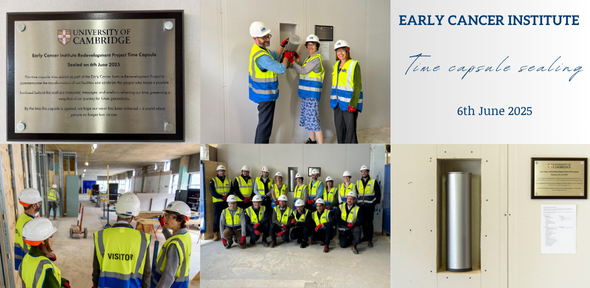Researchers and members of the University of Cambridge’s Early Cancer Institute redevelopment project team have sealed a time capsule to offer future generations a snapshot of life inside a scientific research institute in the 2020s.
The time capsule will be embedded within the redeveloped Li Ka Shing Early Cancer Institute building on the Cambridge Biomedical Campus. Among its contents are photos of current staff, brochures and some everyday lab items such as pipette tips, trays, and even a wired computer mouse - objects that may become relics in the not-so-distant future.
Professor Rebecca Fitzgerald, OBE FMedSci FRS Hon FREng, Director of the Early Cancer Institute, said:
“These seemingly mundane items that we use every day in our research may be unrecognisable to researchers of the future. By then we hope to be nearer to our goal of moving the world beyond fear of cancer.”
The Early Cancer Institute is the UK’s only research institute solely dedicated to understanding early cancer. Detecting and treating cancers earlier dramatically improves survival rates and reduces healthcare costs. The Institute's work focuses on hard-to-treat cancers such as lung, oesophageal, and acute myeloid leukaemia.
The building’s redevelopment is set to transform the Institute into a state-of-the-art facility, enabling researchers to develop pioneering early detection innovations that could ultimately save lives.
The refurbishment project will see refreshed wet labs and new spaces for dry lab facilities. To improve the environmental performance of the building the space heating system will be upgraded from gas-fired boilers to air source heat pumps.
The time capsule event marks the start of the main construction work on the building refurbishment. The project is being funded in part by a generous philanthropic donation received in 2024.

